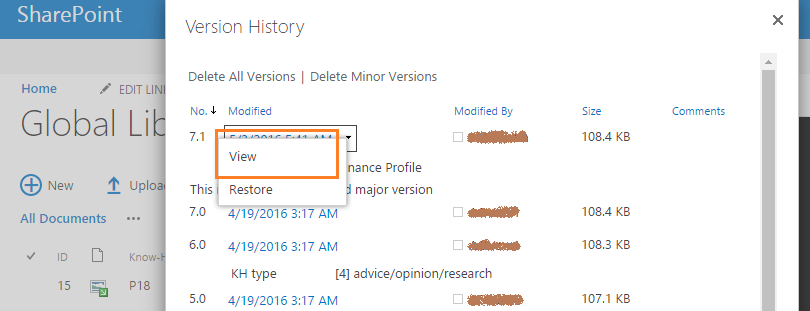You can use below mentioned code to get the details version of specific item from SharePoint list using Client Object Model.
using System;
using System.Collections.Generic;
using System.Linq;
using System.Text;
using Microsoft.SharePoint.Client;
using System.Net;
namespace AccessVersionItems
{
class Class1
{
File file;
FileVersionCollection versions;
ClientContext clientContext;
IEnumerable<Microsoft.SharePoint.Client.FileVersion> oldVersions;
public void GetVersion()
{
clientContext = new ClientContext("http://xxxxxxx/workspace");
clientContext.Credentials = new NetworkCredential("aaaa", "bbbbbb");
Web web = clientContext.Web;
clientContext.Load(web);
clientContext.ExecuteQuery();
string path = web.ServerRelativeUrl + "/Lists/Issue Report/7_.000"; // it represet list id 7
file = web.GetFileByServerRelativeUrl(path);
ListItem versionListItem = file.ListItemAllFields;file.ListItemAllFields.FieldValues["Defect_x0020_Name"]
clientContext.Load(versionListItem);
clientContext.ExecuteQuery();
versions = file.Versions;
clientContext.Load(versions);
oldVersions = clientContext.LoadQuery(versions.Where(v => v != null));
clientContext.ExecuteQuery();
if (oldVersions != null)
{
foreach (Microsoft.SharePoint.Client.FileVersion _version in oldVersions)
{
Console.WriteLine("Version : {0}", _version.VersionLabel); // till working fine
File f = web.GetFileByServerRelativeUrl("/"+_version.Url.ToString());
clientContext.Load(f, ff => ff.ListItemAllFields);
clientContext.ExecuteQuery();
string a = "";
}
}
Console.ReadKey();
}
}
}
Note:-
Please change all server & list details (in variables) according to your server
UPDATED
Please replace below code
File f = web.GetFileByServerRelativeUrl("/"+_version.Url.ToString());
with
string versionItemUrl = file.ServerRelativeUrl.Replace(Path.GetFileName(file.ServerRelativeUrl),"") + _version.Url;
File oldFile = web.GetFileByServerRelativeUrl(versionItemUrl);
& try again.

